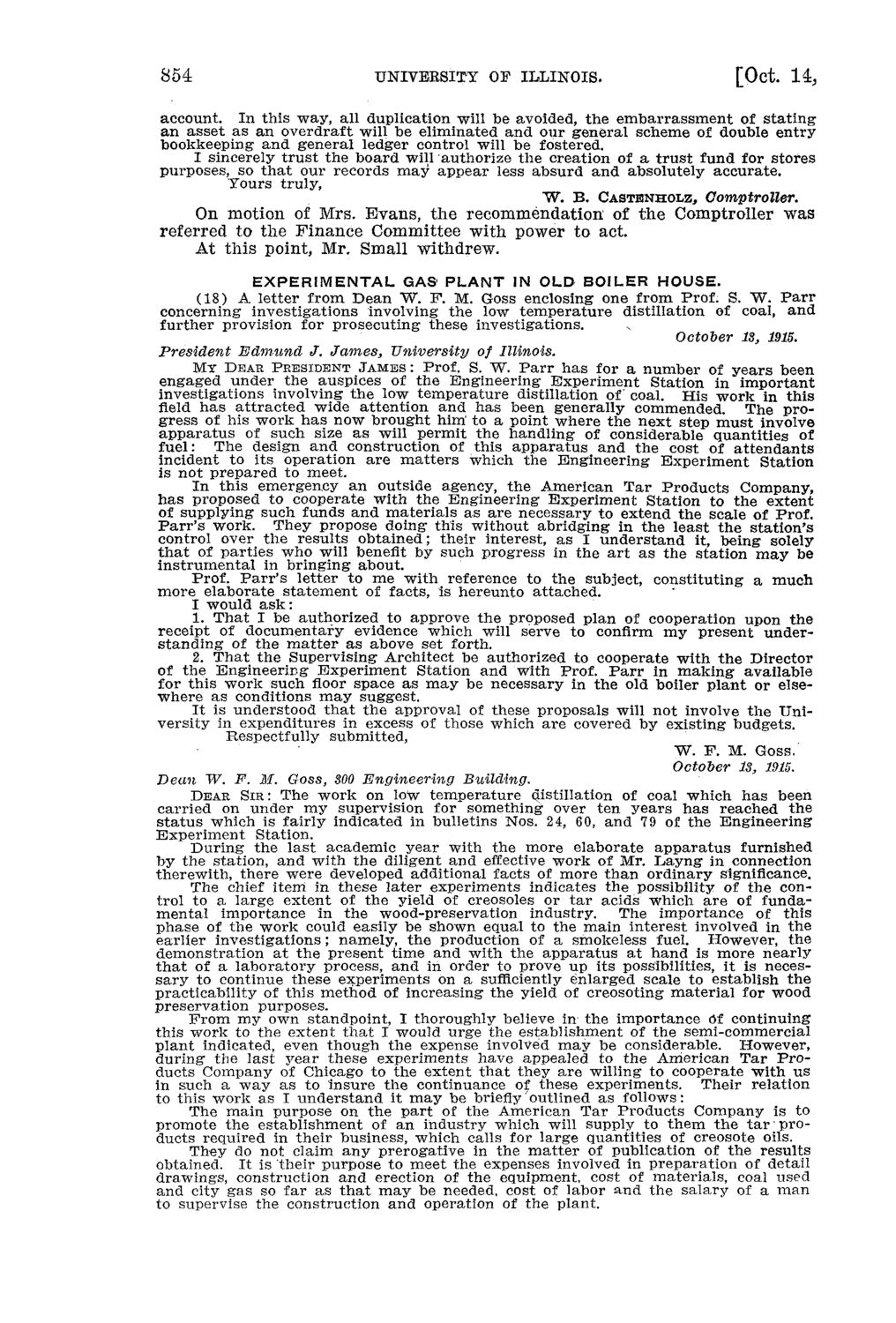| |
| |
Caption: Board of Trustees Minutes - 1916
This is a reduced-resolution page image for fast online browsing.

EXTRACTED TEXT FROM PAGE:
854 UNIVERSITY OF ILLINOIS. [Oct. 14, account. In this way, all duplication will be avoided, the embarrassment of stating an asset as an overdraft will be eliminated and our general scheme of double entry bookkeeping and general ledger control will be fostered. I sincerely trust the board will authorize the creation of a trust fund for stores purposes, so that our records may appear less absurd and absolutely accurate. Yours truly, W. B. CASTENHOLZ, Comptroller, On motion of Mrs. Evans, the recommendation of the Comptroller was referred to the Finance Committee with power to act. At this point, Mr. Small withdrew. E X P E R I M E N T A L GAS' P L A N T I N O L D BOILER HOUSE. (18) A letter from Dean W. F . M. Goss enclosing one from Prof. S. W. Parr concerning investigations involving the low temperature distillation of coal, and further provision for prosecuting these investigations. October IS, 1915. President Edmund J. James, University of Illinois. engaged under the auspices of the Engineering Experiment Station in important investigations involving the low temperature distillation of coal. His work in this field has attracted wide attention and has been generally commended. The progress of his work has now brought him' to a point where the next step must involve apparatus of such size as will permit the handling of considerable quantities of fuel: The design and construction of this apparatus and the cost of attendants incident to its operation are matters which the Engineering Experiment Station is not prepared to meet. In this emergency an outside agency, the American Tar Products Company, has proposed to cooperate with the Engineering Experiment Station to the extent of supplying such funds and materials as are necessary to extend the scale of Prof. Parr's work. They propose doing this without abridging in the least the station's control over the results obtained; their interest, as I understand it, being solely that of parties who will benefit by such progress in the a r t as the station may be instrumental in bringing about. Prof. Parr's letter to me with reference to the subject, constituting a much more elaborate statement of facts, is hereunto attached. I would a s k : 1. That I be authorized to approve the proposed plan of cooperation upon the receipt of documentary evidence which will serve to confirm my present understanding of the matter as above set forth. 2. That the Supervising Architect be authorized to cooperate with the Director of the Engineering Experiment Station and with Prof. Parr in making available for this work such floor space as may be necessary in the old boiler plant or elsewhere as conditions may suggest. It is understood that the approval of these proposals will not involve the University in expenditures in excess of those which are covered by existing budgets. Respectfully submitted, W. F . M. Goss. October IS, 1915. Dean W. F. M. Goss, 300 Engineering Building. DEAR S I R : The work on low temperature distillation of coal which has been carried on under my supervision for something over ten years has reached the status which is fairly indicated in bulletins Nos. 24, 60, and 79 of the Engineering Experiment Station. During the last academic year with the more elaborate apparatus furnished by the station, and with the diligent and effective work of Mr. Layng in connection therewith, there were developed additional facts of more than ordinary significance. The chief item in these later experiments indicates the possibility of the control to a large extent of the yield of creosoles or t a r acids which are of fundamental importance in the wood-preservation industry. The importance of this phase of the work could easily be shown equal to the main interest involved in the earlier investigations; namely, the production of a smokeless fuel. However, the demonstration at the present time and with the apparatus at hand is more nearly that of a laboratory process, and in order to prove up its possibilities, it is necessary to continue these experiments on a sufficiently enlarged scale to establish the practicability of this method of increasing the yield of creosoting material for wood preservation purposes. From my own standpoint, I thoroughly believe in the importance Of continuing this work to the extent that I would urge the establishment of the semi-commercial plant indicated, even though the expense involved may be considerable. However, during the last j^ear these experiments have appealed to the American Tar Products Company of Chicago to the extent that they are willing to cooperate with us in such a way as to insure the continuance of these experiments. Their relation to this work as I understand it may be briefly'outlined as follows: The main purpose on the part of the American Tar Products Company is to promote the establishment of an industry which will supply to them the t a r products required in their business, which calls for large quantities of creosote oils. They do not claim any prerogative in the matter of publication of the results obtained. It is their purpose to meet the expenses involved in preparation of detail drawings, construction and erection of the equipment, cost of materials, coal used and city gas so far as that may be needed, cost of labor and the salary of a man to supervise the construction and operation of the plant. MY DEAR PRESIDENT JAMES : Prof. S. W. P a r r has for a number of years been
| |